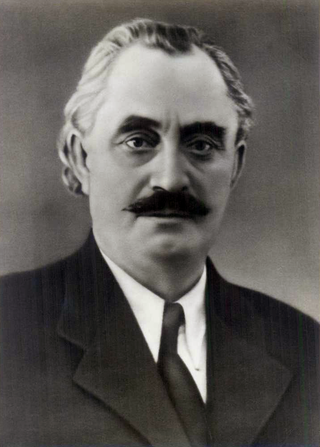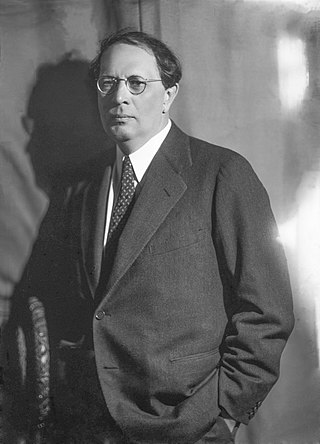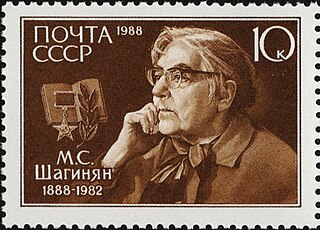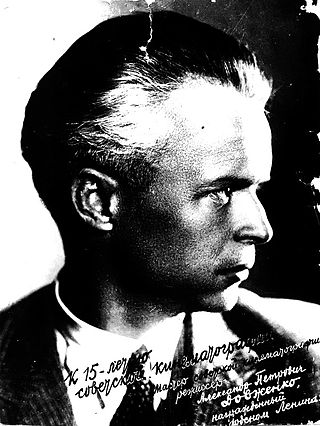Life
Yefim Pridvorov was born to a poor family in the village of Hubivka, in Kherson Governorate, now in Ukraine. At the age of seven, his father took him to live in Yelysavethrad, but six years later, he was sent back to his home village to live with his mother "in extreme poverty". [1] When he was 14, his father secured him a paid-for place in a feldsher training college in Kyiv, which was followed by four years of military service. In 1904, he entered the philological and historical faculty of Petersburg University. His university years coincided with the heady times of the 1905 Russian Revolution, which Pridvorov, like most other students, became an ardent supporter. In 1911, he began to be published in communist newspapers such as Pravda , and in 1912, he joined the Russian Social Democratic Labour Party (Bolsheviks). Also in 1911, he published the poem "Of Demyan Bedny," which led to him being known by that name, and he began a private correspondence with Vladimir Lenin that was said to develop into a long-lasting personal friendship. His first collected works were published in Basni (Fables) in 1913. During World War I, he once again saw service as a feldsher and was decorated.
He was a steadfast supporter of the Bolshevik cause throughout the 1917 Russian Revolution and the Russian Civil War by writing agitprop from the frontlines. Arthur Ransome described him in 1919 as "fatter than he used to be (admirers from the country send him food) with a round face, shrewd laughing eyes, and cynical mouth, a typical peasant." [2] He was decorated with the Order of the Red Banner in 1923, followed by the Order of Lenin in 1933. In the 1920s and the 1930s, he was very popular and variously supported by the Soviet regime. The town of Spassk, Penza Oblast, was even renamed Bednodemyanovsk in his honour. He was the only writer to be allocated rooms in the Kremlin. His first political setback came in December 1930, when two of his historical poems were censured by the Party Central Committee. He wrote a plaintive letter to Stalin asking, and received a long reply accusing him of having insulted the Russian working class. Stalin also disliked a play that Bedny had written in 1932 about the Red Army, calling it "mediocre". [3]
In September 1932, a report stating Bedny's debauched life during a Soviet Communist Party Poliburo meeting made Stalin decided to evict Bedny from his Kremlin apartment. He was relocated to Rozhdestvensky Boulevard, which he called a rat's barn. He told the poet Osip Mandelstam that he had been reported by a secretary, who had heard him complain that Stalin left grubby finger marks on books borrowed from Bedny's private library, [4] but it appears that Bedny's real offence was that his writings were highly critical of Russia's imperialist past, but Stalin, though he was not an ethnic Russian, "nevertheless grasped that Russian nationalism was the glue that held the Soviet Union together". [5] In November 1936, the Politburo condemned Bedny's opera The Bogatyrs for its "antihistorical and mocking depiction of Old Russia's acceptance of Christianity." [6] He tried to regain favour with verses virulently attacking prominent victims of the Great Purge. His poem that as published in Pravda on 21 August 1936 to mark the show trial of Grigori Zinoviev and others was headed 'No Mercy'. On 12 June 1937, he published a 54-line poem celebrating the previous day's announcement that Marshal Tukhachevsky and other Red Army commanders had been arrested, which included all of their names in a rhyming scheme. [7] Nonetheless, in 1938, Bedny was stripped of membership in the Communist Party and of the Union of Soviet Writers, and in 1941, Stalin remarked to Georgi Dimitrov "ten volumes of verse by Demyan Bedny are not worth one poem of Mayakovsky's". [8] However, Bedny slowly regained the favour of Stalin during World War II. Bedny's poem commemorating the Soviet victory was published in Pravda on May 3, 1945. He died two weeks later, on May 19.

Nikolai Ivanovich Bukharin was a Russian revolutionary, Soviet politician, and Marxist theorist. A prominent Bolshevik described by Vladimir Lenin as a "most valuable and major theorist" of the Communist Party, Bukharin was active in the Soviet leadership from 1917 to his purge in the 1930s.

Osip Emilyevich Mandelstam was a Russian and Soviet poet. He was one of the foremost members of the Acmeist school.

Georgi Dimitrov Mihaylov also known as Georgiy Mihaylovich Dimitrov, was a Bulgarian communist politician who served as leader of the Bulgarian Communist Party from 1933 to 1949, and the first leader of the Communist People's Republic of Bulgaria from 1946 to 1949. From 1935 to 1943, he was the General Secretary of the Communist International.

Aleksey Nikolayevich Tolstoy was a Russian writer whose works span across many genres, but mainly belonged to science fiction and historical fiction.
Nash Put was a daily newspaper published in Moscow between September 7-25 1913. It functioned as a legal organ of the Russian Social Democratic Labour Party.

Andrey Andreyevich Andreyev was a Soviet Communist politician. An Old Bolshevik who rose to power during the rule of Joseph Stalin, joining the Politburo as a candidate member in 1926 and as a full member in 1932, Andreyev also headed the powerful Central Control Commission of the Communist Party of the Soviet Union from 1930 to 1931, and then again from 1939 until 1952.

Ivan Ivanovich Skvortsov-Stepanov was a prominent Russian Bolshevik revolutionary and Soviet politician.

Marietta Sergeevna Shaginyan was a Soviet writer, historian and activist of Armenian descent. She was one of the "fellow travelers" of the 1920s led by the Serapion Brotherhood and became one of the most prolific communist writers experimenting in satirico-fantastic fiction.

Dmitriy Zakharovich Manuilsky or Dmytro Zakharovych Manuilsky was an important Bolshevik revolutionary, Soviet politician and academic who was Secretary of the Executive Committee of Comintern, the Communist International, from December 1926 to its dissolution in May 1943.
Zvezda (Star) was a Russian newspaper which subsequently was incorporated into Pravda. Originally it was the legal organ of the Duma's Social Democratic faction. The paper had separate sections on “In the World of Labor,” “Workers’ Life,” “The Workers’ Movement,” “The State Duma,” “Press Survey,” “Chronicle,” “Around and About Russia,” “The Provinces,” and “Life Abroad.” The newspaper was published from December 29, 1910 to May 5, 1912.

Platon Mikhailovich Kerzhentsev, was a Soviet state and party official, revolutionary, diplomat, journalist, historian, playwright and theatre and arts theorist who was involved with the Proletkult movement.

Elena Dmitriyevna Stasova was a Russian Soviet revolutionary, Old Bolshevik and an early leader of the organisation that would go on to become the Communist Party of the Soviet Union.

Alexander Petrovich Dovzhenko, also Oleksandr Petrovych Dovzhenko, was a Soviet film director and screenwriter of Ukrainian origin. He is often cited as one of the most important early Soviet filmmakers, alongside Sergei Eisenstein, Dziga Vertov, and Vsevolod Pudovkin, as well as being a pioneer of Soviet montage theory.

Pyotr Andreyevich Pavlenko, was a Soviet writer, screenwriter and war correspondent. Recipient of four Stalin Prizes.

Lev Borisovich Kamenev was a Russian revolutionary and Soviet politician. An Old Bolshevik, Kamenev was a leading figure in the early Soviet government, serving as the first head of state of the Russian SFSR as chairman of the All-Russian Congress of Soviets, and as a deputy premier of the Soviet Union from 1923 to 1926, among other roles.

Alexey Alexandrovich Surkov was a Russian Soviet poet, editor, literary critic and high-profile nomenklatura figure, the head of the Soviet Union of Writers in 1953–1959, notorious for his role in the persecution of Boris Pasternak

Leopold Leonidovich Averbakh was a Soviet literary critic, who was the head of the Russian Association of Proletarian Writers (RAPP) in the 1920s and the most prominent member of a group of communist literary critics who argued that the Bolshevik Revolution, carried out in 1917 in the name of Russia's industrial working class, should be followed by a cultural revolution, in which bourgeois literature would be supplanted by literature written by and for the proletariat. Averbakh was a powerful figure in Russian cultural circles until Joseph Stalin ordered RAPP to cease its activities in 1932.

Matvei Fyodorovich Shkiryatov was a Communist Party official and functionary who rose to power in the Soviet Union during the rule of Joseph Stalin. His entire career was spent imposing party discipline through the Central Control Commission of the Communist Party of the Soviet Union. Though far less well known than successive chiefs of the Soviet police, such as Nikolai Yezhov or Lavrentiy Beria, he was arguably as steeply involved as either of them in the repression during the Stalin years. Unlike them, he escaped arrest or public notoriety.
Vladimir Vladimirovich Yermilov was a hard line Soviet literary critic and scholar best known for his role in hounding the poet Vladimir Mayakovsky.
Sofia Ivanovna Sokolovskaya, also known as Yelena Kirillovna Svetlova was a Russian revolutionary, politician and senior official of the Soviet film industry until she became a victim of the Great Purge.
















